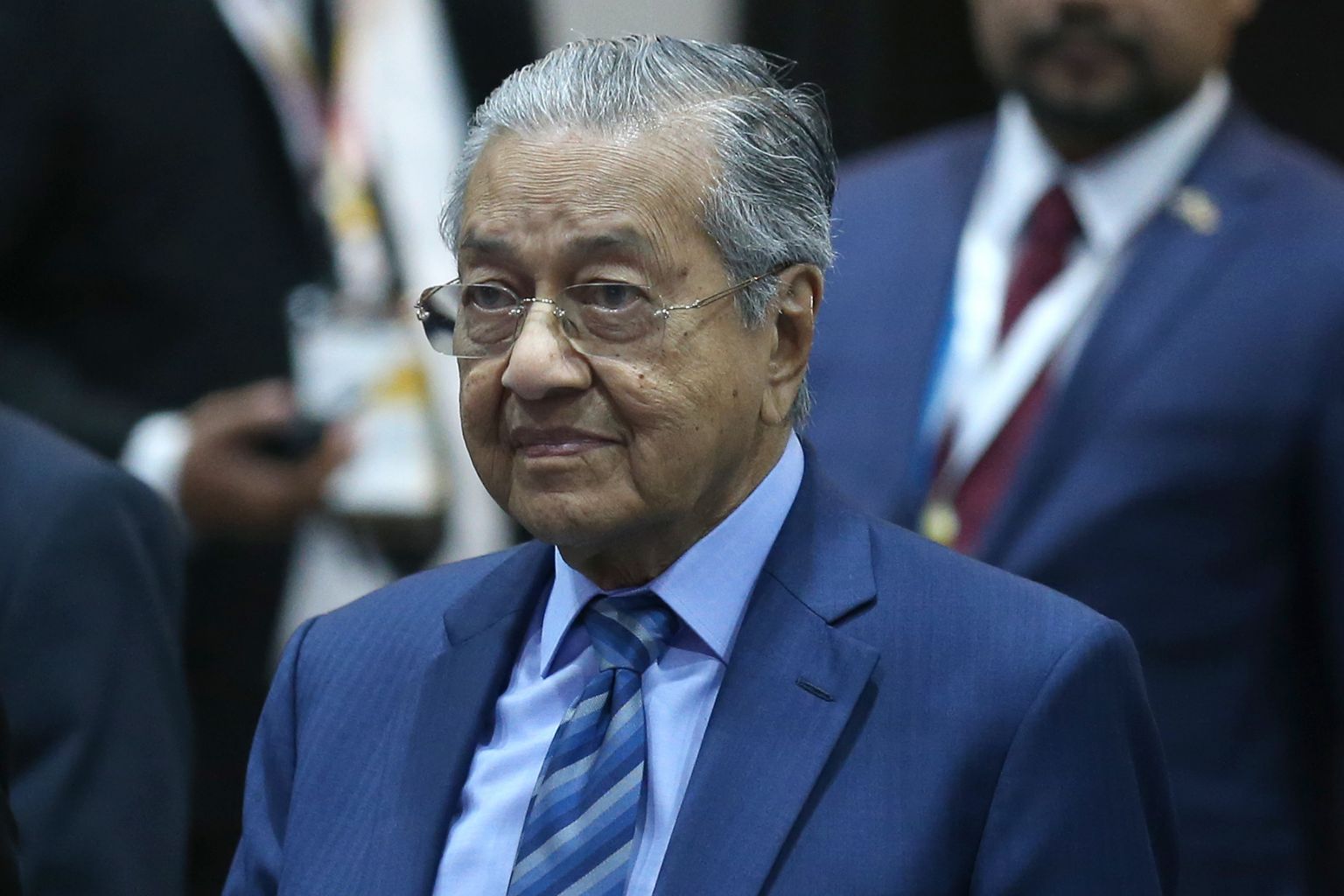US-China trade war not expected to last long, says Malaysia PM Mahathir Mohamad
Sign up now: Get insights on the biggest stories in Malaysia

Malaysian Prime Minister Mahathir Mohamad (pictured) hit back at US protectionist policies, particularly the trade war with China and Donald Trump's presidency.
PHOTO: EPA-EFE
Hathai Techakitteranun
Follow topic:
BANGKOK - Malaysian Prime Minister Mahathir Mohamad said the current surge in protectionism highlighted by the US-China trade war will not last long and free trade will triumph at the end. He was speaking on Saturday (Nov 2) at the Asean Business and Investment Summit 2019, an annual sideline event to the Asean Summit held in Bangkok between Oct 31 and Nov 4.
"Popularism is mounting in Europe and America where there are talks about limiting trade, about trade wars and applying higher taxes for imports. But I think this will not last very long because they will understand that if they cut themselves off from the new producers, they tend to lose a lot. They cannot really stop trade from expanding and becoming multilateral," said the 94-year-old veteran politician.
"There is a fear now that competition this time would benefit the countries in the East, rather than the developed countries from the West. That is why now there is a lot of resistance expressed openly by the people. And the politicians have responded, listening to the people, their worry about their jobs, about their growth, etc, and they like to now restrict trade, rather than have free trade, because now they understand that they are at the wrong end," Dr Mahathir added.
Calling US President Donald Trump, who did not participate in the summit for the second year in a row, "not a very nice man", Dr Mahathir hit back at US protectionist policies, particularly the trade war with China and his presidency.
"People will come to their senses one day. At the very worst, this is going to go on for another five years, if he wins. When you limit the presidency to two terms, then the damage done will be much less," he said.
In June 2018, President Trump began to set tariffs and other trade barriers on China to force the country to stop what the US called "unfair trade practices" following the influx of low-priced Chinese goods to the US and elsewhere globally. China retaliated with its own tariffs on imported products from the US.
On Friday, the World Trade Organisation gave China the green light to impose sanctions on up to US$3.6 billion (S$4.88 billion) worth of US goods, about half of what China was seeking in the dispute over the levies placed on 40 Chinese goods six years ago during the Obama administration.
Dr Mahathir said China's growth has stemmed from the fact that the country has fully utilised human capital, something Asean has yet to achieve, mainly due to the fragmented voices of the 10 member countries. He added that people in Asean need to be educated on technologies.
"China is well ahead of us because they are much better integrated than us. We need to speak with one voice in the international stage so they will listen to us," he said.
Dr Nigel Gould-Davies, a political science professor at Mahidol University near Bangkok, said: "Mahathir's remarks show how much has changed. After the 1997 crisis, he was a bitter critic of globalisation. Now he calls for Asean to unite to protect an open global economy against the threat to it from the US. It's a remarkable reversal."
With the absence of President Trump and US Secretary of State Mike Pompeo from the summit due largely to an impending impeachment move against the President, the downgraded US presence is deemed to give China room to further exert influence in South-East Asia, he added.
At the summit, AirAsia CEO Tony Fernandes pointed to barriers such as customs duty as the biggest obstacle for trade development within the Asean region, while urging Asean governments to facilitate companies in the bloc so that they are able to compete with global companies.
"I think it's easier for a Chinese company to sell in Asean than for Asean companies to do the same. Asean governments bend over backwards to help Alibaba for instance. There's nothing wrong with that. But let's give Asean companies a level playing field," the Malaysian CEO told The Straits Times.
Last year, the Chinese e-commerce giant entered into a strategic partnership with the Thai government by pledging nearly 11 billion baht (S$496 million) worth of investment in the digital hub at the Eastern Economic Corridor (EEC), Thailand's export-oriented economic region.
Mr Fernandes said the trade war has not affected his airline but it was the ongoing massive protests in Hong Kong that caused AirAsia's ticket sales to fall by approximately 30 per cent compared to last year.

